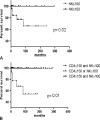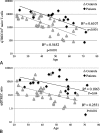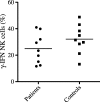Idiopathic CD4 lymphocytopenia: clinical and immunologic characteristics and follow-up of 40 patients
- PMID: 24646462
- PMCID: PMC4616307
- DOI: 10.1097/MD.0000000000000017
Idiopathic CD4 lymphocytopenia: clinical and immunologic characteristics and follow-up of 40 patients
Abstract
Idiopathic CD4 T lymphocytopenia (ICL) is a rare and severe condition with limited available data. We conducted a French multicenter study to analyze the clinical and immunologic characteristics of a cohort of patients with ICL according to the Centers for Disease Control criteria.We recruited 40 patients (24 female) of mean age 44.2 ± 12.2 (19-70) years. Patients underwent T-lymphocyte phenotyping and lymphoproliferation assay at diagnosis, and experiments related to thymic function and interferon (IFN)-γ release by natural killer (NK) cell were performed. Mean follow-up was 6.9 ± 6.7 (0.14-24.3) years. Infectious, autoimmune, and neoplastic events were recorded, as were outcomes of interleukin 2 therapy.In all, 25 patients had opportunistic infections (12 with human papillomavirus infection), 14 had autoimmune symptoms, 5 had malignancies, and 8 had mild or no symptoms. At the time of diagnosis, the mean cell counts were as follows: mean CD4 cell count: 127/mm (range, 4-294); mean CD8: 236/mm (range, 1-1293); mean CD19: 113/mm (range, 3-547); and mean NK cell count: 122/mm (range, 5-416). Most patients had deficiency in CD8, CD19, and/or NK cells. Cytotoxic function of NK cells was normal, and patients with infections had a significantly lower NK cell count than those without (p = 0.01). Patients with autoimmune manifestations had increased CD8 T-cell count. Proliferation of thymic precursors, as assessed by T-cell rearrangement excision circles, was increased. Six patients died (15%). CD4 T-cell count <150/mm and NK cell count <100/mm were predictors of death.In conclusion, ICL is a heterogeneous disorder often associated with deficiencies in CD8, CD19, and/or NK cells. Long-term prognosis may be related to initial CD4 and NK cell deficiency.
Conflict of interest statement
Financial support and conflicts of interest: This study was funded by a grant from the Direction de la Recherche Clinique et du Développement of the Assistance Publique-Hôpitaux de Paris. The authors listed below have received financial support (personal or institutional) from the listed pharmaceutical or medical device companies, unrelated to the present work. GC: MSD France; ND: Janssen, Boerhinger, Expanscience, Roche; LG: Actelion, Roche, LFB Biotechnologies, CSL Behring; LM: LFB Biotechnologies, CSL Behring, Pfizer, Actelion, Lilly, Roche.
Figures






References
-
- Aledort LM, Operskalski EA, Dietrich SL, Koerper MA, Gjerset GF, Lusher JM, Lian EC, Mosley JW. Low CD4+ counts in a study of transfusion safety. The Transfusion Safety Study Group. N Engl J Med. 1993;328:441–442. - PubMed
-
- Alisjahbana B, Dinata R, Sutedja E, Suryahudaya I, Soedjana H, Hidajat NN, Soetikno RD, Oktaliansah E, Deng A, Rady P, Tyring S, Gaspari AA. Disfiguring generalized verrucosis in an Indonesian man with idiopathic CD4 lymphopenia. Arch Dermatol. 2010;146:69–73. - PubMed
-
- Busch MP, Valinsky JE, Paglieroni T, Prince HE, Crutcher GJ, Gjerset GF, Operskalski EA, Charlebois E, Bianco C, Holland PV, et al. Screening of blood donors for idiopathic CD4+ T-lymphocytopenia. Transfusion. 1994;34:192–197. - PubMed
-
- Cunningham-Rundles C, Bodian C. Common variable immunodeficiency: clinical and immunological features of 248 patients. Clin Immunol. 1999;92:34–48. - PubMed
Publication types
MeSH terms
Substances
LinkOut - more resources
Full Text Sources
Other Literature Sources
Research Materials

